Energy is associated with the orientation and distribution of molecules in space. Disordered crystals have higher entropy than ordered crystals and diffused gases have higher entropy than compressed gases.
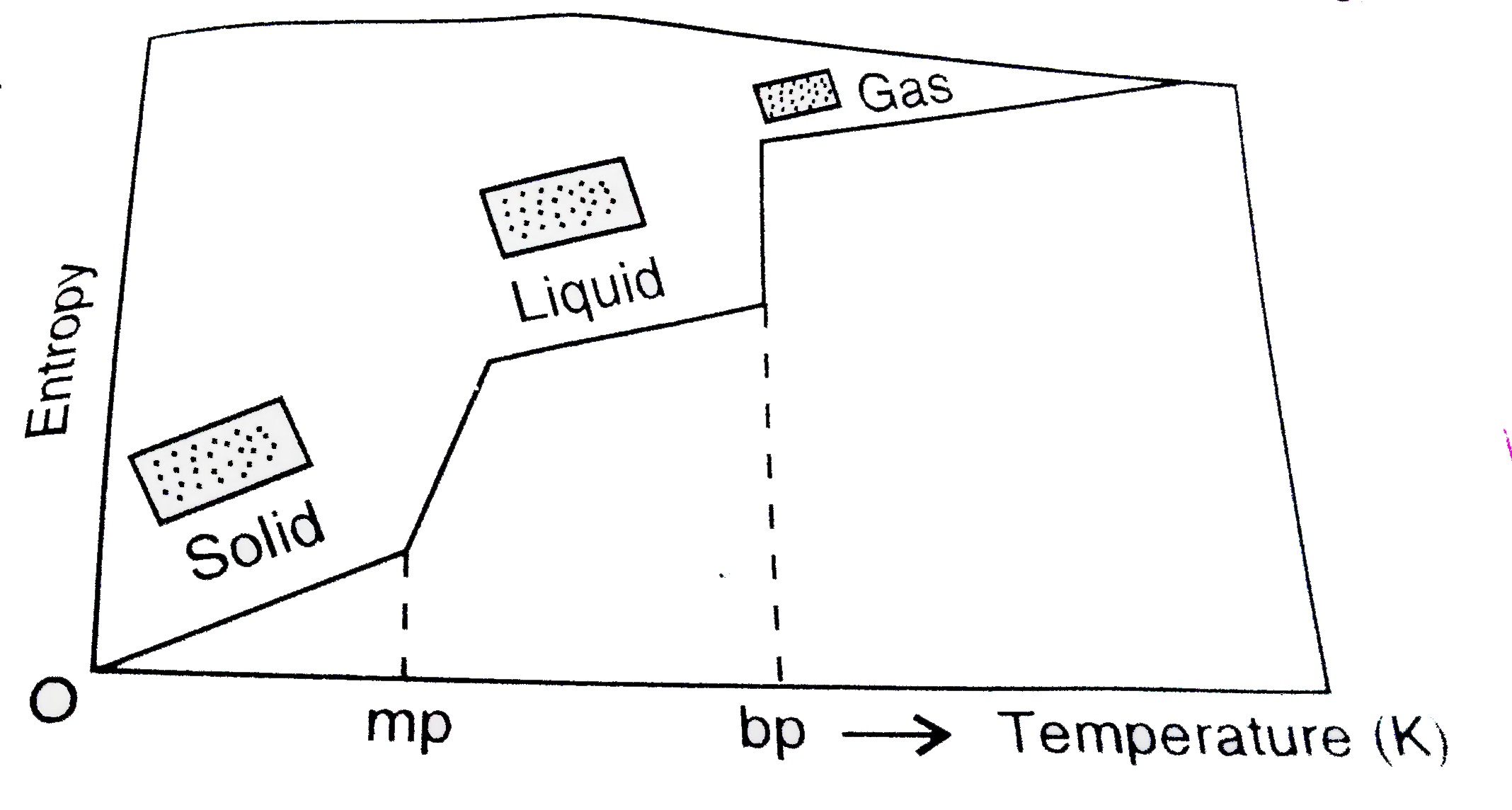
Entropy is also associated with molecular motion. As the temperature of a substance increases, random molecular motion increases hence entropy increases. Figure gives variation of entropy with temperature. At absolute zero (−273∘C) every substance is in solid state whose particles are rigidly fixed in a crystalline structure. If there is no residual orientational disorder, like that in CO, entropy of the substance is zero. Third law of thermodynamics states.
At the absolute zero of temperature the entropy of every substance become zero and does become zero in case of perfectly crystalline structure.
understand(T→0)(LtS)=0
In case of CO and NO molecules in solid state, there is randomness even at 0K due to their dipole moments hence entropy in such cases is not zero even at 0K. As the temperature is raised, the molecules begin to vibrate. The number of ways in which the vibrational energy can be distributed increases with increases in temperature and the entropy of solid increases steadily as the temperature increaes. At the melting point (mp) of the solid, there is a discontinous jump in entropy because there are many more ways of arranging the molecules in the liquid than in the solid. An even greater jump in entropy is observed at the boiling point (bp) because molecules in the gas are to free to occupy a more larger volume and randomness increases.
Which has the highest entropy per mol of the substance ?
H2 at 25∘C at 1 atm
H2 at STP
H2 at 100K at 1 atm
H_(2)at0 Kat1 atm
The correct Answer is:A
Topper's Solved these Questions
Similar Questions
Knowledge Check
Energy is associated with the orientation and distribution of molecules in space. Disordered crystals have higher entropy than ordered crystals and diffused gases have higher entropy than compressed gases.
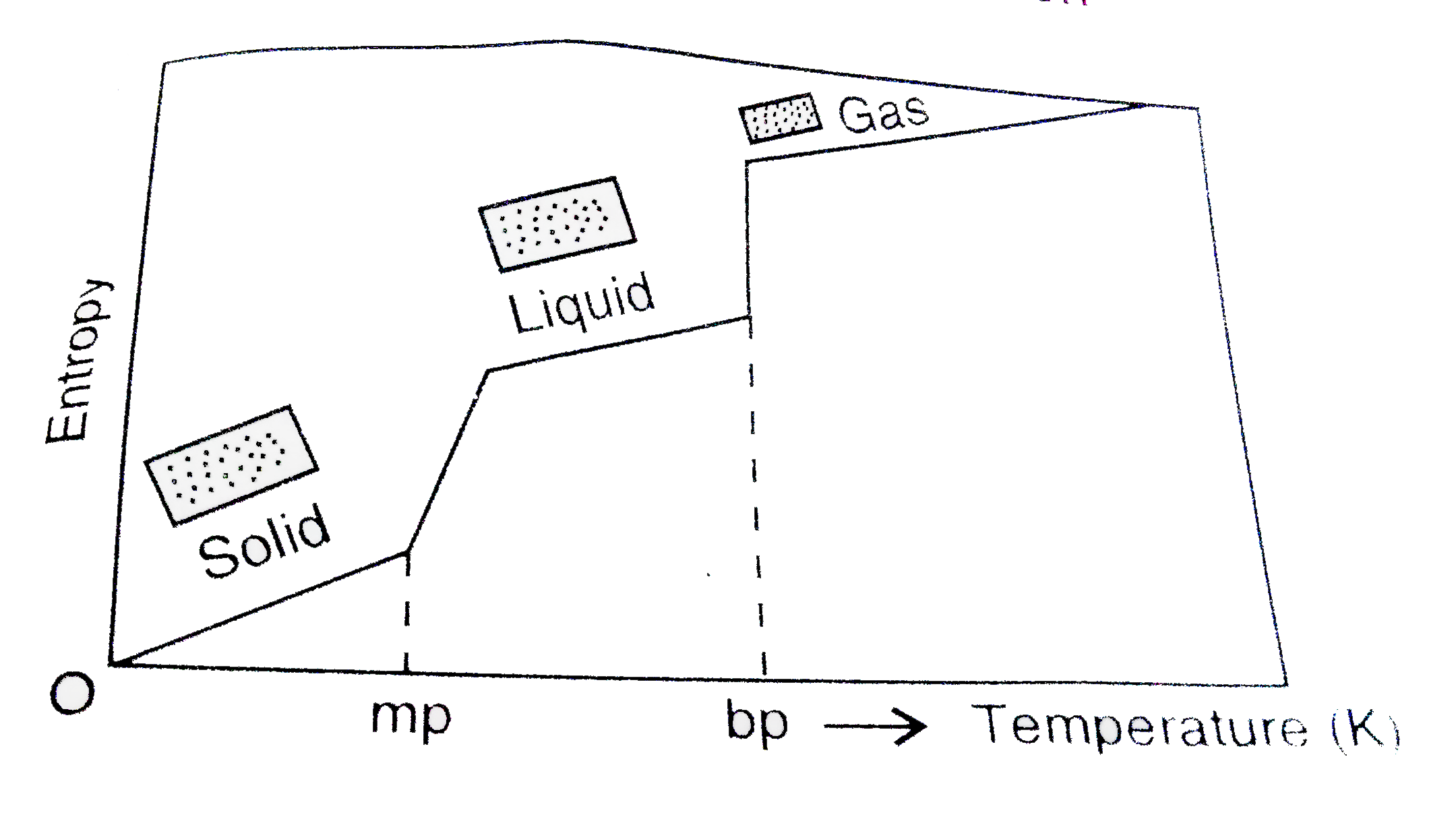
Entropy is also associated with molecular motion. As the temperature of a substance increases, random molecular motion increases hence entropy increases. Figure gives variation of entropy with temperature. At absolute zero (−273∘C) every substance is in solid state whose particles are rigidly fixed in a crystalline structure. If there is no residual orientational disorder, like that in CO, entropy of the substance is zero. Third law of thermodynamics states.
At the absolute zero of temperature the entropy of every substance become zero and does become zero in case of perfectly crystalline structure.
understand(T→0)(LtS)=0
In case of CO and NO molecules in solid state, there is randomness even at 0K due to their dipole moments hence entropy in such cases is not zero even at 0K. As the temperature is raised, the molecules begin to vibrate. The number of ways in which the vibrational energy can be distributed increases with increases in temperature and the entropy of solid increases steadily as the temperature increaes. At the melting point (mp) of the solid, there is a discontinous jump in entropy because there are many more ways of arranging the molecules in the liquid than in the solid. An even greater jump in entropy is observed at the boiling point (bp) because molecules in the gas are to free to occupy a more larger volume and randomness increases.
Which has maximum entropy of vaporisation ?AEthanol (l)BBenzene (l)CToluene (l)DCO2(g)Energy is associated with the orientation and distribution of molecules in space. Disordered crystals have higher entropy than ordered crystals and diffused gases have higher entropy than compressed gases.
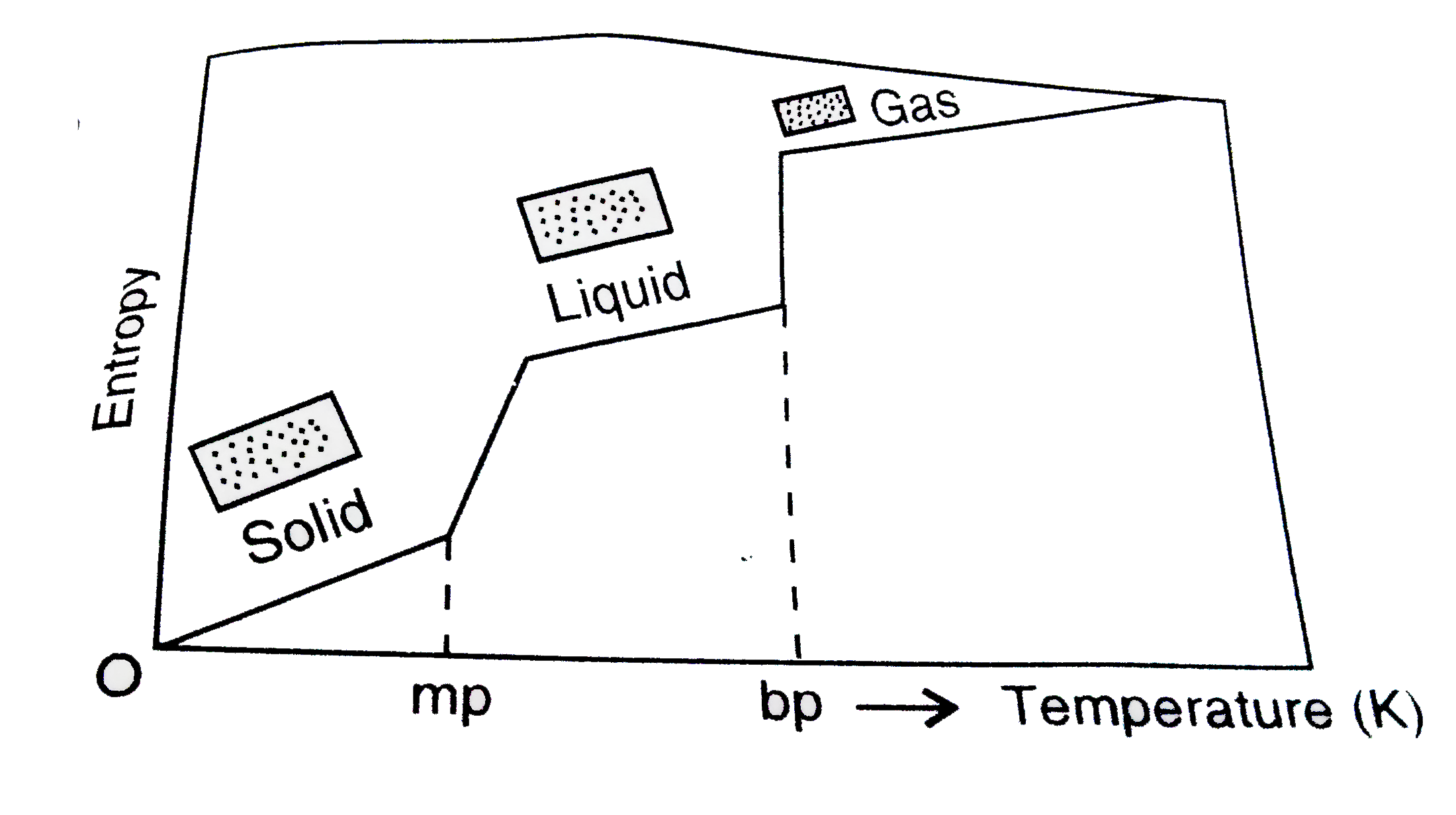
Entropy is also associated with molecular motion. As the temperature of a substance increases, random molecular motion increases hence entropy increases. Figure gives variation of entropy with temperature. At absolute zero (−273∘C) every substance is in solid state whose particles are rigidly fixed in a crystalline structure. If there is no residual orientational disorder, like that in CO, entropy of the substance is zero. Third law of thermodynamics states.
At the absolute zero of temperature the entropy of every substance become zero and does become zero in case of perfectly crystalline structure.
understand(T→0)(LtS)=0
In case of CO and NO molecules in solid state, there is randomness even at 0K due to their dipole moments hence entropy in such cases is not zero even at 0K. As the temperature is raised, the molecules begin to vibrate. The number of ways in which the vibrational energy can be distributed increases with increases in temperature and the entropy of solid increases steadily as the temperature increaes. At the melting point (mp) of the solid, there is a discontinous jump in entropy because there are many more ways of arranging the molecules in the liquid than in the solid. An even greater jump in entropy is observed at the boiling point (bp) because molecules in the gas are to free to occupy a more larger volume and randomness increases.
Which of the following process is spontaneous?ADiffusion of perfume molecules from one side of the room to the otherBDecomposition of solid CaCO3CHeat flow from a cold object to a hot objectDClimbing up a mountain.Energy is associated with the orientation and distribution of molecules in space. Disordered crystals have higher entropy than ordered crystals and diffused gases have higher entropy than compressed gases.
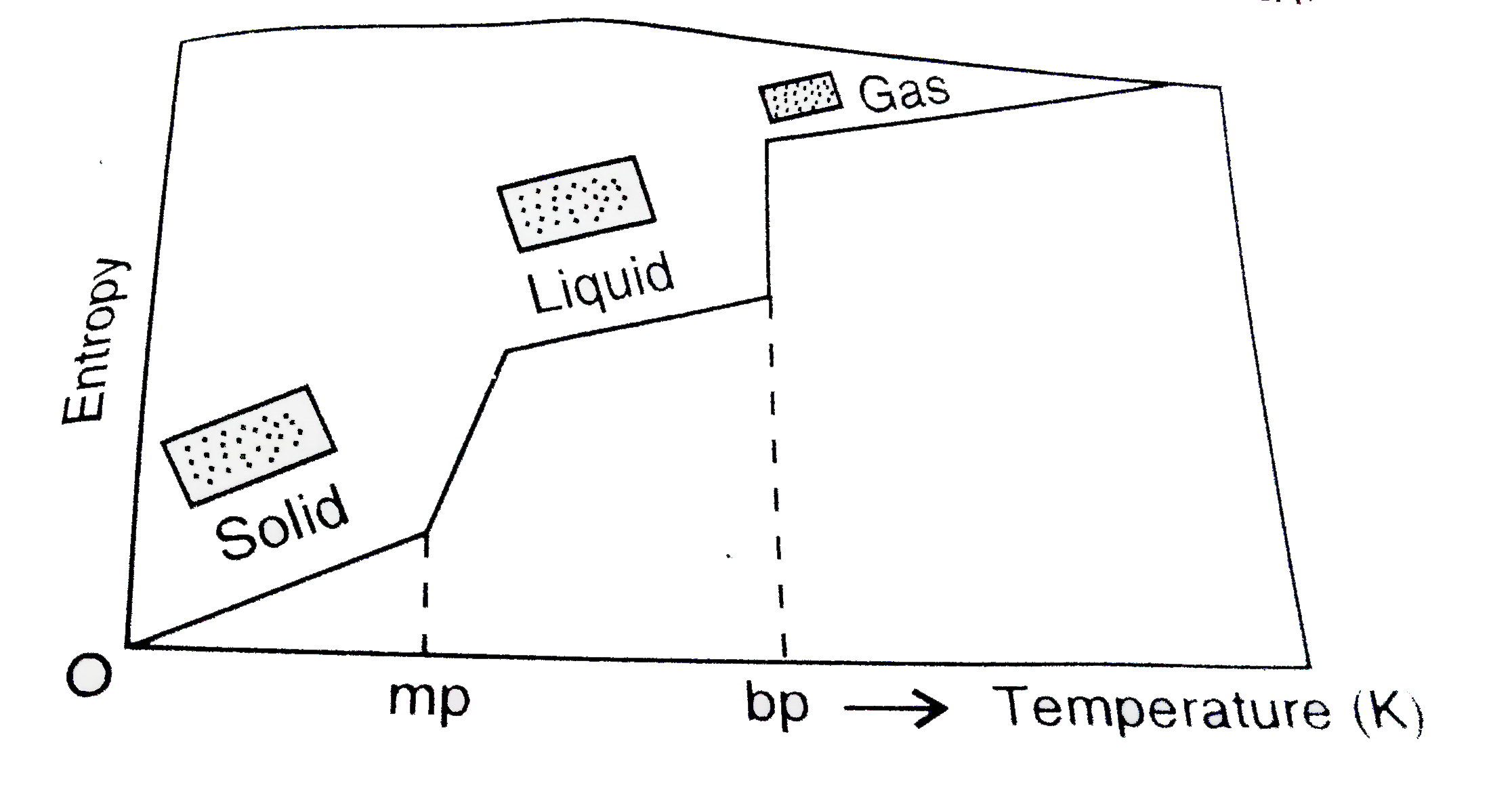
Entropy is also associated with molecular motion. As the temperature of a substance increases, random molecular motion increases hence entropy increases. Figure gives variation of entropy with temperature. At absolute zero (−273∘C) every substance is in solid state whose particles are rigidly fixed in a crystalline structure. If there is no residual orientational disorder, like that in CO, entropy of the substance is zero. Third law of thermodynamics states.
At the absolute zero of temperature the entropy of every substance become zero and does become zero in case of perfectly crystalline structure.
understand(T→0)(LtS)=0
In case of CO and NO molecules in solid state, there is randomness even at 0K due to their dipole moments hence entropy in such cases is not zero even at 0K. As the temperature is raised, the molecules begin to vibrate. The number of ways in which the vibrational energy can be distributed increases with increases in temperature and the entropy of solid increases steadily as the temperature increaes. At the melting point (mp) of the solid, there is a discontinous jump in entropy because there are many more ways of arranging the molecules in the liquid than in the solid. An even greater jump in entropy is observed at the boiling point (bp) because molecules in the gas are to free to occupy a more larger volume and randomness increases.
For the following reaction
CaCO3(s)→CaO(s)+CO2(g)
If at 0K, ΔS of this reaction is Xcalmol−1 then entropy of CO2(g) at 0K isA−XcalB−2XcalC+XcalD0cal
Why is entropy of substance taken as zero at absolute zero of temperature?
View SolutionCompare the entropy of gases with solids.
View SolutionEnergy is associated with the orientation and distribution of molecules in space. Disordered crystals have higher entropy than ordered crystals and diffused gases have higher entropy than compressed gases.

Entropy is also associated with molecular motion. As the temperature of a substance increases, random molecular motion increases hence entropy increases. Figure gives variation of entropy with temperature. At absolute zero (−273∘C) every substance is in solid state whose particles are rigidly fixed in a crystalline structure. If there is no residual orientational disorder, like that in CO, entropy of the substance is zero. Third law of thermodynamics states.
At the absolute zero of temperature the entropy of every substance become zero and does become zero in case of perfectly crystalline structure.
understand(T→0)(LtS)=0
In case of CO and NO molecules in solid state, there is randomness even at 0K due to their dipole moments hence entropy in such cases is not zero even at 0K. As the temperature is raised, the molecules begin to vibrate. The number of ways in which the vibrational energy can be distributed increases with increases in temperature and the entropy of solid increases steadily as the temperature increaes. At the melting point (mp) of the solid, there is a discontinous jump in entropy because there are many more ways of arranging the molecules in the liquid than in the solid. An even greater jump in entropy is observed at the boiling point (bp) because molecules in the gas are to free to occupy a more larger volume and randomness increases.
Which of the following process is spontaneous?
View SolutionEnergy is associated with the orientation and distribution of molecules in space. Disordered crystals have higher entropy than ordered crystals and diffused gases have higher entropy than compressed gases.
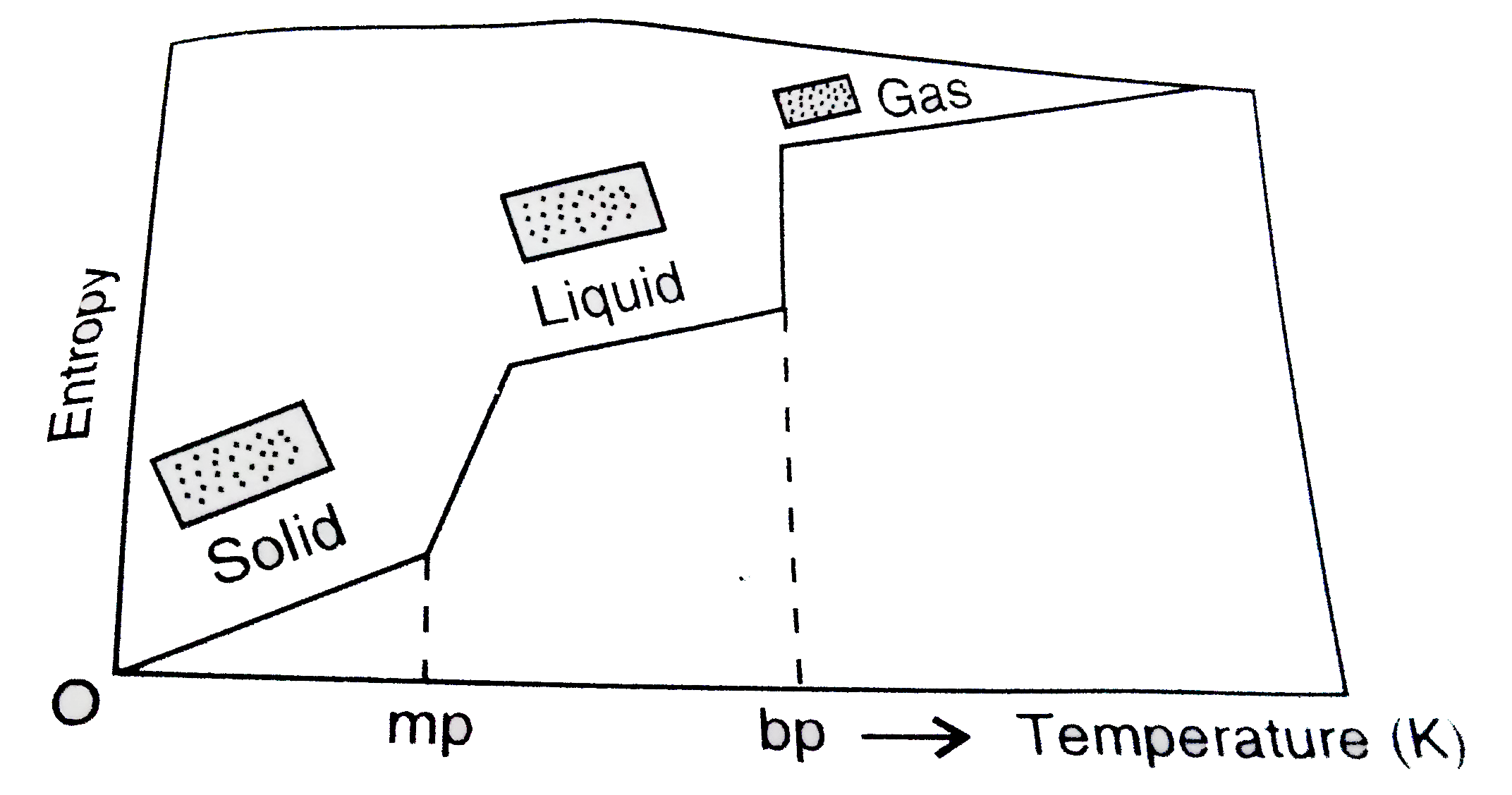
Entropy is also associated with molecular motion. As the temperature of a substance increases, random molecular motion increases hence entropy increases. Figure gives variation of entropy with temperature. At absolute zero (−273∘C) every substance is in solid state whose particles are rigidly fixed in a crystalline structure. If there is no residual orientational disorder, like that in CO, entropy of the substance is zero. Third law of thermodynamics states.
At the absolute zero of temperature the entropy of every substance become zero and does become zero in case of perfectly crystalline structure.
understand(T→0)(LtS)=0
In case of CO and NO molecules in solid state, there is randomness even at 0K due to their dipole moments hence entropy in such cases is not zero even at 0K. As the temperature is raised, the molecules begin to vibrate. The number of ways in which the vibrational energy can be distributed increases with increases in temperature and the entropy of solid increases steadily as the temperature increaes. At the melting point (mp) of the solid, there is a discontinous jump in entropy because there are many more ways of arranging the molecules in the liquid than in the solid. An even greater jump in entropy is observed at the boiling point (bp) because molecules in the gas are to free to occupy a more larger volume and randomness increases.
Out of the following statements : I, II and III. I . A system may be a complex as a human body as simple as a mixture consiting of a drop of water.
II. A large system is said to be microscopic when it consists of a large number of molecules, atoms or ions.
III. Pressure, volume, temperature and surface area are some macroscopic properties.
Select correct statements
View SolutionEnergy is associated with the orientation and distribution of molecules in space. Disordered crystals have higher entropy than ordered crystals and diffused gases have higher entropy than compressed gases.
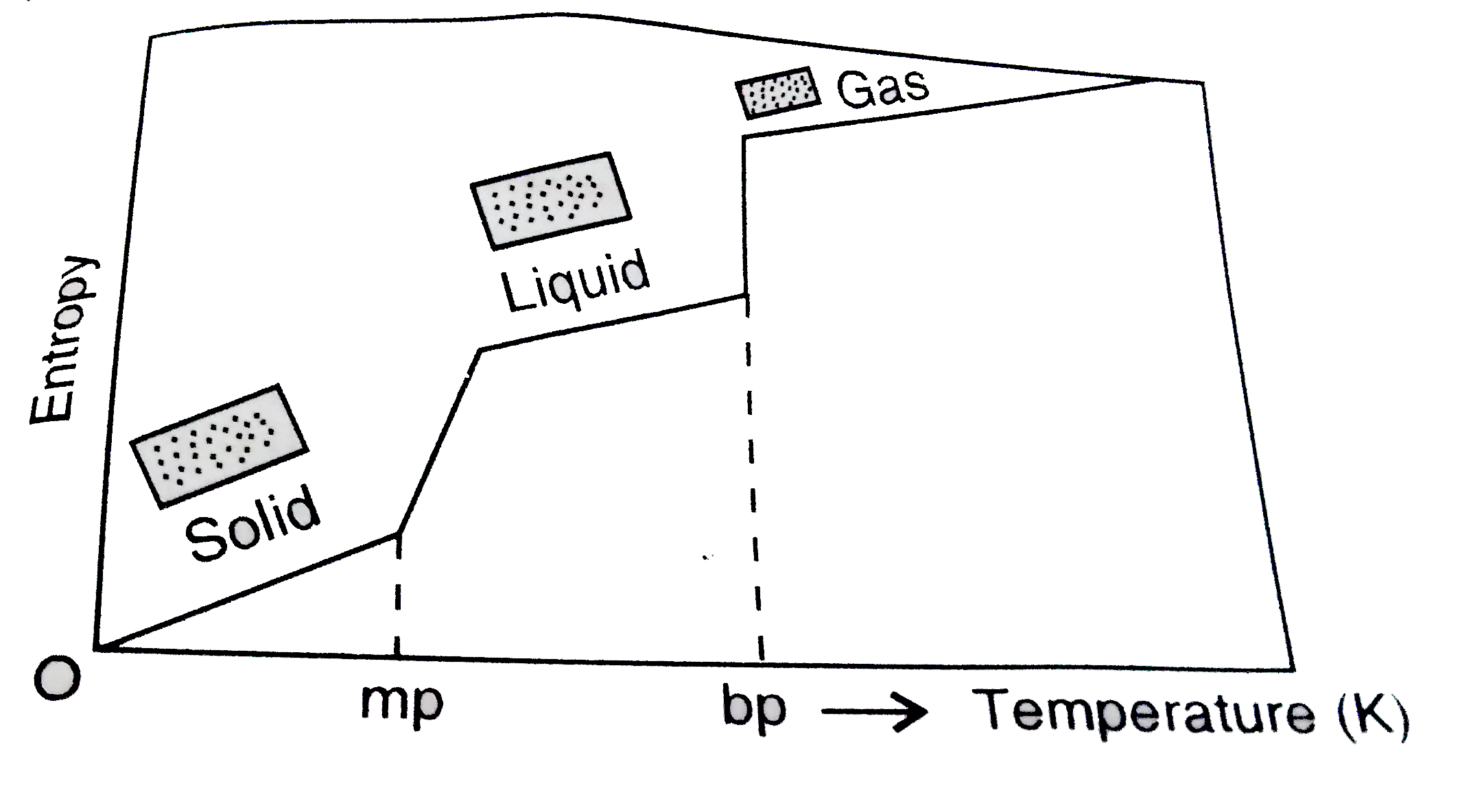
Entropy is also associated with molecular motion. As the temperature of a substance increases, random molecular motion increases hence entropy increases. Figure gives variation of entropy with temperature. At absolute zero (−273∘C) every substance is in solid state whose particles are rigidly fixed in a crystalline structure. If there is no residual orientational disorder, like that in CO, entropy of the substance is zero. Third law of thermodynamics states.
At the absolute zero of temperature the entropy of every substance become zero and does become zero in case of perfectly crystalline structure.
understand(T→0)(LtS)=0
In case of CO and NO molecules in solid state, there is randomness even at 0K due to their dipole moments hence entropy in such cases is not zero even at 0K. As the temperature is raised, the molecules begin to vibrate. The number of ways in which the vibrational energy can be distributed increases with increases in temperature and the entropy of solid increases steadily as the temperature increaes. At the melting point (mp) of the solid, there is a discontinous jump in entropy because there are many more ways of arranging the molecules in the liquid than in the solid. An even greater jump in entropy is observed at the boiling point (bp) because molecules in the gas are to free to occupy a more larger volume and randomness increases.
Predict the sign of ΔS in the system for each of the following process
(I)CO2(s)→CO2(g)
(II)CaSO4(s)→CaO(s)+SO3(g)
(III)N2(g)+3H2(g)→2NH3(g)
(IV)I2(s)→I2(aq)
View Solution
